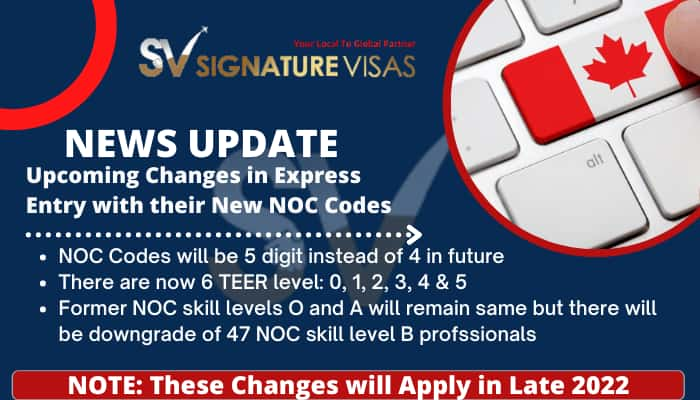Are you planning for immigration to Canada in 2022. The IRCC is ready to implement some changes in Canada express entry NOC codes in 2022. Here are the details of that.
With the coming of the new year, there are some changes expected in the NOC list. The IRCC and ESDC will bring these changes in effect from 2022
The National Occupational Classification (NOC) plays an important role in the immigration system of Canada, and the work experience of the applicant is assessed with the help of NOC requirements. Before applying, the foreign nationals have to meet the work experience and NOC requirements that fall under the NOC skill level 0, A, or B as an eligibility requirement.
The NOC is a reference for occupations, and the employment activities are asses as per the Canadian labor market, government programs, skills development, and foreign worker programs.
At present, the Immigration, Refugees and Citizenship Canada (IRCC), ESDC, and Canada’s provinces and territories use NOC 2016. Now a revised list is presented, which will include some pertinent changes.
Summary of Canada Express Entry NOC Codes Changes
- The NOC’s has brought a new six-category system instead of the earlier four-category system. As per the current list NOC A requires university degrees, NOC B requires skilled trades or requires a college diploma, NOC C requires intermediate skills or job-specific training, and NOC D requires labor jobs training.
- NOC 2021 is all set to use the five-digit codification system instead of the current four-digit system.
The changes that are expected are as follows:
| TEER 0 |
|
| TEER 1 |
- Completion of a university degree (bachelor’s, master’s or doctorate); or
- Many years of Work experience in a specific occupation from TEER category 2 ( if applicable).
|
| TEER 2 |
- Post-secondary education program of two to three years at community college, institute of technology or CÉGEP; or
- An apprenticeship training program of two to five years; or
- Occupations with supervisory or significant safety (police officers and firefighters) responsibilities; or
- Many of experience in a specific occupation from TEER category 3 ( if applicable).
|
| TEER 3 |
- Post-secondary education needs to be of less than two years at community college, institute of technology or CÉGEP; or
- Apprenticeship training Program of less than 2 years; or
- There should be more than six months of on-the-job training, training courses or specific experience with some secondary school education; or
- Many of experience in a specific occupation from TEER category 4 (when applicable).
|
| TEER 4 |
- Completion of secondary school; or
- A lot many weeks of on-the-job training with some secondary school education; or
- Several years of work experience in a specific occupation from TEER category 5 (when applicable).
|
| TEER 5 |
- Short work and no formal educational requirements.
|
Will it Affect the Immigrants?
It will have little or no effect on immigration as the work experience remains the same, but some additional programs and work experience are classified for some. Thus, changes are expected in eligibility requirements for a few occupations.
By: Pawan
On:01-11-2021

